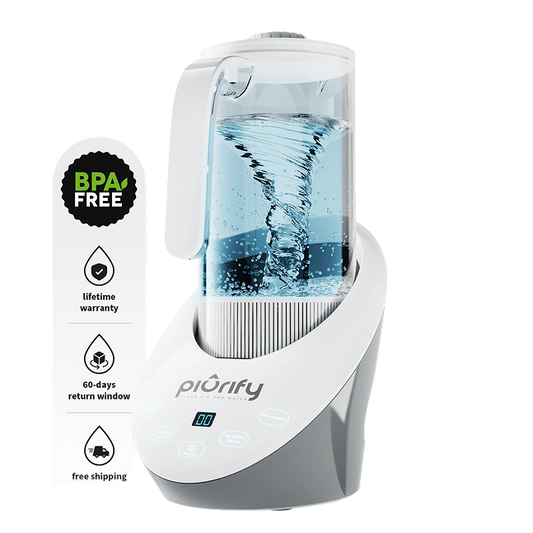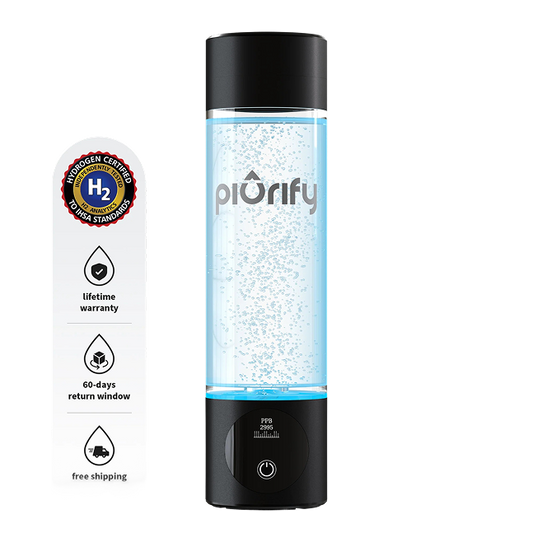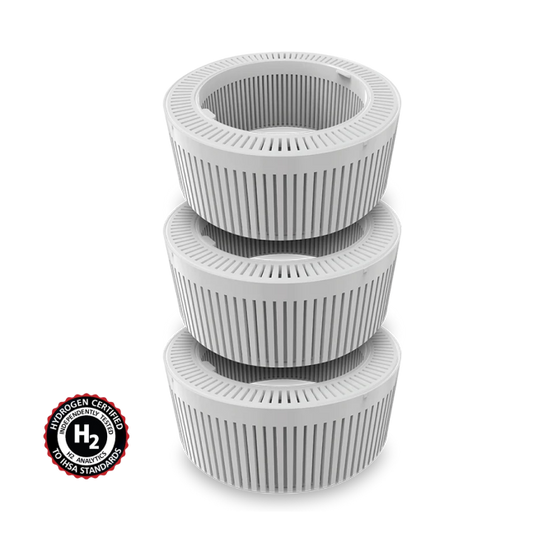Is Overhydration a Thing?
Staying hydrated is essential for maintaining optimal health, supporting bodily functions, and sustaining energy levels. You may have heard experts recommend drinking around six to eight 8-ounce glasses of water daily. However, your needs may vary depending on age, physical activity level, climate, and overall health.
Some days, you may exceed the recommended amount of water to stay hydrated. But can drinking too much water be harmful? Is overhydration a thing?
What Is Overhydration?
Overhydration occurs when you consume more water than your kidneys can eliminate or excrete, leading to an electrolyte imbalance in your body. It is also known as water intoxication or water poisoning. Drinking excessive water can affect your kidneys' ability to remove it from your body, resulting in water retention. This can cause your cells to swell, leading to potential health risks.
Causes of Overhydration
Overhydration or water poisoning can occur due to the following causes:
- Excessive water intake: People with normal kidney function generally don't experience overhydration, as the kidneys can easily excrete excess water. However, drinking over 6 gallons or 23 liters, which is about 96 cups of water, daily can overload your kidneys and cause overhydration. Overhydration can also occur if you drink large amounts of water in a short period, especially during intense exercise. It is often seen in endurance athletes who drink excessive water to avoid dehydration.
- Medical conditions: Individuals with preexisting conditions such as heart failure or kidney disease may have a higher risk of developing overhydration. These conditions can impair your body's ability to regulate water balance, leading to water retention and causing overhydration. Additionally, a syndrome of inappropriate antidiuretic hormone secretion (SIADH) can cause the pituitary gland to release too much antidiuretic hormone — a hormone that tells the kidneys to retain water. This can cause unnecessary water retention in the body and lead to overhydration.
- Medications: Some medications like diuretics and antidepressants can cause water retention or make you feel excessively thirsty. This can lead to increased water intake, causing overhydration.
- Psychological factors: Psychological conditions like psychogenic polydipsia, where individuals have an uncontrollable urge to drink water, can also lead to overhydration.
Symptoms of Overhydration
Common symptoms of overhydration include nausea, vomiting, headaches, confusion, and tiredness. Swelling, particularly in the hands, feet, and face, can occur due to water retention. Muscle cramps and weakness may occur due to electrolyte imbalance.
Slow or mild overhydration allows your cells to adapt, causing mild symptoms. But sudden and severe cases of overhydration can lead to disorientation and even seizures due to swelling in the brain. Additionally, overhydration can increase blood volume and lead to fluid accumulation in the lungs and lower legs.
If you notice these symptoms, you must seek medical attention immediately.
Risks and Health Consequences
Overhydration presents several risks and potential health consequences. Consuming too much water can decrease the concentration of electrolytes, like sodium, in your bloodstream. This can cause hyponatremia, or low sodium levels. Low sodium levels can cause symptoms ranging from discomfort and dizziness to severe neurological issues like confusion, seizures, and coma [Source: BMC Nephrology].
Water intoxication can cause fluid retention and swelling. In severe cases, excess water intake can lead to swelling in the brain. This can increase pressure inside the skull and lead to potential health risks.
Fluid accumulation can also cause swelling in the lungs or pulmonary edema, causing breathing difficulty and compromised lung function. Excess fluid in the body can increase the volume of blood. This can strain the heart and increase the risk of cardiovascular complications.
Excessive water drinking can overload the kidneys and impair their function, affecting the ability to regulate hydration and electrolyte balance. It can also lead to gastrointestinal problems, nausea, and vomiting.
Understanding these risks can help you balance hydration levels carefully and seek medical attention if you notice symptoms of overhydration.
Who Is at Risk of Overhydration?
The following groups are at a higher risk of developing overhydration [Source: MSD Manual]:
- People engaging in intense physical activity who consume too much water to prevent dehydration.
- Endurance athletes who take in excessive fluid without proper electrolyte replacement.
- Individuals with psychogenic polydipsia, a condition causing compulsive water drinking.
- People with medical conditions like heart failure, kidney disorders being treated with dialysis, liver disease, or SIADH.
- Individuals taking medications like diuretics, antidepressants, or others that affect fluid balance.
- Older adults with reduced kidney function.
- Infants with developing kidney function.
- Those living in hot and humid climates or situations where excessive sweating occurs.
Recognizing these risk factors is crucial for preventing overhydration and its associated health consequences.
What to Do if You Suspect Overhydration
If you notice signs of overhydration, seek immediate medical attention to prevent potential complications. Contact a healthcare professional if you or someone else is experiencing symptoms such as nausea, confusion, swelling, or changes in mental status.
Check your urine color to see if you have overhydration — colorless urine over many days may indicate excess water intake. Consider reducing or temporarily stopping fluid intake unless otherwise advised by your doctor. Monitor symptoms closely and pay attention to any headaches, muscle cramps, or unusual feelings of tiredness or disorientation.
Doctors may conduct tests to evaluate electrolyte levels and determine the severity of your overhydration. They identify water-intoxicated individuals by performing blood and urine tests to check electrolyte concentrations. They also check for increased body weight and edema or swelling in the body [Source: MSD Manual].
Based on the results, they will provide you with guidance on proper hydration, medications, and lifestyle changes. They may ask you to limit your water consumption to less than 1 quart or 4 cups of water [Source: MSD Manual]. They may also prescribe diuretics or medicines that increase your frequency of urination to eliminate water from your body.
Avoid self-diagnosing or attempting to treat overhydration on your own, as it requires professional evaluation and management. Medical care can help prevent risks associated with overhydration and ensure a safe recovery.
Maintain Balanced and Proper Hydration With Ease
Maintaining balanced hydration supports overall health and vitality. So, monitor your body’s water needs and drink enough fluids daily to achieve proper hydration levels.
To stay hydrated and enhance the quality of the water you drink, Piurify offers innovative products like the Water Hydrogenator. Its built-in filter removes impurities and restores essential minerals in the water you drink. It produces hydrogen water, which is known to have anti-inflammatory, antioxidant, and revitalizing properties. Incorporating Piurify’s Water Hydrogenator can help you effectively support your body's hydration needs with cleaner, healthier drinking water.
Check out the Piurify collection to take charge of your health and start your journey toward better hydration today.


